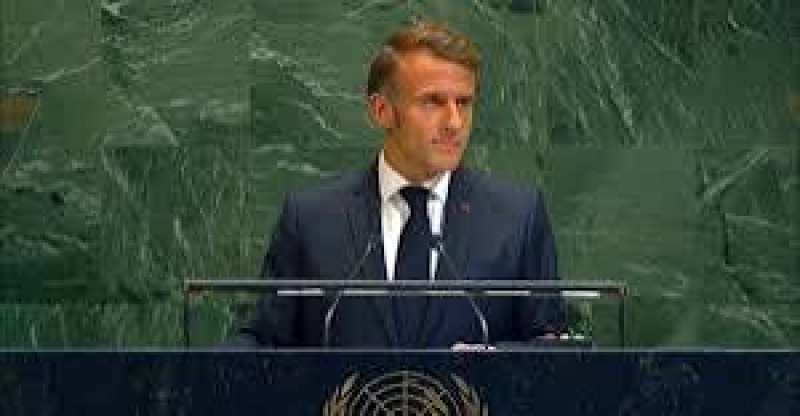- No Media Faced Arson Attacks in 53 Years: Mahfuz Anam |
- Janaza of six Bangladeshi peacekeepers held at Dhaka Cantonment |
- Bangladesh stock market loses Tk 10,500cr in a week |
- Dhaka’s air turns ‘very unhealthy’ on Sunday morning |
- Project to transform N’ganj into a climate-resilient green city |
France Recognizes Palestinian State at UN Meeting

France officially recognized Palestinian statehood on Monday during the opening of a high-level United Nations meeting aimed at reviving efforts toward a two-state solution in the Middle East. The move comes as the war in Gaza continues and more nations signal readiness to follow, defying opposition from Israel and the United States.
French President Emmanuel Macron’s declaration inside the UN General Assembly was met with applause from over 140 world leaders in attendance. Members of the Palestinian delegation, including UN envoy Riyad Mansour, stood to acknowledge the announcement.
“Remaining true to France’s historic commitment to peace in the Middle East, I declare that today, France recognizes the State of Palestine,” Macron said.
Several other European nations—Andorra, Belgium, Luxembourg, Malta, and Monaco—either confirmed or announced similar recognition, following recent decisions by the UK, Canada, Australia, and Portugal. However, key players like Germany, Italy, and Japan attended the conference without extending recognition.
Despite the diplomatic momentum, the move is expected to have limited impact on the ground, where Israeli military operations in Gaza continue and settlement expansion in the West Bank intensifies.
Abbas Calls for Peace, Condemns Violence
Palestinian President Mahmoud Abbas, who addressed the conference by video after the U.S. revoked his visa, reiterated condemnation of all civilian attacks, including those carried out by Hamas on October 7, 2023.
He noted that the Palestinian Authority had scrapped its controversial policy of financially supporting families of Palestinians imprisoned or killed by Israel—long a demand of both Israel and the U.S.—and is establishing a new social welfare system.
Appealing to the Israeli public, Abbas said: “Enough violence and war,” while extending greetings to Jews worldwide on the occasion of Rosh Hashanah.
The Palestinian Authority, which governs parts of the West Bank, recognizes Israel and remains committed to a two-state solution, though it is viewed by many Palestinians as corrupt and disconnected from the population. Israel, for its part, has ruled out any role for the Authority in postwar Gaza and accuses it of inciting militancy.
Roughly 75% of UN member states already recognize Palestine, though many Western powers had previously withheld formal recognition, insisting on a negotiated settlement with Israel.
Palestinians fleeing the fighting in Gaza expressed cautious optimism. “This is a beginning, or a glimmer of hope,” said Fawzi Nour al-Deen, one of thousands displaced from Gaza City. “We are a people who deserve a state.”
The two-state framework, envisioning a Palestinian state alongside Israel in the West Bank, Gaza, and East Jerusalem—territories occupied by Israel since 1967—is widely supported internationally as the only viable long-term solution.
Israel’s government, led by Prime Minister Benjamin Netanyahu, rejected the statehood recognitions, warning they reward Hamas after its 2023 attack. Netanyahu has suggested Israel may respond with unilateral actions, including annexation of parts of the West Bank—steps that could make Palestinian statehood all but impossible.
Despite such threats, UN spokesperson Stéphane Dujarric emphasized the need to stay focused on long-term peace efforts. “We must not be distracted by intimidation or threats,” he said.
Netanyahu, facing pressure from far-right allies to move forward with annexation, is expected to decide on Israel’s response after meeting U.S. President Donald Trump at the White House next week. He is also scheduled to address the UN on Friday.
Meanwhile, the Trump administration—now back in power—has criticized the growing international recognition of Palestine, blaming it for the collapse of ceasefire negotiations. Trump's envoy, Steve Witkoff, exited the talks in July, and earlier this month, Israel conducted a targeted strike on Hamas negotiators in Qatar, a key mediator.
Political Divisions Continue
France and Saudi Arabia have proposed a phased peace plan that would see a reformed Palestinian Authority governing both Gaza and the West Bank with international support. The plan was endorsed by 142 countries in the UN General Assembly earlier this month.
Hamas, which won the last Palestinian elections in 2006, remains committed to establishing a state over all of historic Palestine, including present-day Israel, although it has occasionally hinted at accepting a state within the 1967 borders.
U.S.-brokered peace talks have repeatedly failed since the 1990s due to recurring violence and continued Israeli settlement expansion. There have been no substantive negotiations since Netanyahu returned to power in 2009.
Analysts warn that without a viable path to Palestinian statehood, Israel may face a future where it must choose between continued occupation or a binational state in which Jews could become a demographic minority, reports UNB.

